Lupe Garcia would break your heart.
She would not mean to. She would feel terrible about it, once she found out you were suffering, suffering because of her. And she would let you down easy. But the pitcher on "A League of Their Own," Prime Video's new series adaptation of the 1992 film, is a heartbreaker. As played by the wonderful Roberta Colindrez, so compelling in "I Love Dick," another adaptation that never really got its fair chance, Lupe gives everything she has. Just like a mother.
"A League of Their Own" does, as Salon's Melanie McFarland writes, "what [Penny] Marshall could not in 1992." The Prime Video series includes storylines for significant characters of color, including Chanté Adams as Maxine, a young woman who takes a factory job in the hope of being allowed to play ball on the company team; the utterly magnetic Gbemisola Ikumelo as Clance, Max's beloved best friend and an aspiring writer of comic books; and Colindrez as Lupe. None of these roles were in the original film. Tellingly, they are some of the absolute best in the series.
Lupe represents a person who's already lived. Who has struggled, failed, been pushed down and knows exactly what's at stake.
The story, both film and series, takes place during World War II. As men are sent off to war, America misses baseball and the strapping young men who would run the bases. So, a league of professional female athletes emerges out of the Midwest, originally intended as little more than a publicity stunt as bankrolled by candy bar magnate Walter Harvey. To Harvey's surprise, and probably not ours, the women baseball players are good. And serious.
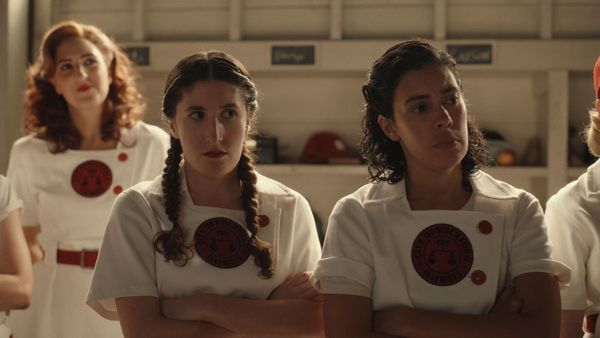 A League Of Their Own (Courtesy of Prime Video)Lupe best represents the struggle of the female athletes to be taken seriously. She wants to play the game, enough that she doesn't have much space to object when the press starts labeling her "the Spanish striker." What choice or power does she have? As Colindrez says in an interview with the Los Angeles Times, "That serves as a perfect example of the exotification that is engendered within racism itself . . . Why do y'all have to qualify it? Lupe's main drag is, 'I don't want to just be a really good Latin player. I am a really good baseball player.'"
A League Of Their Own (Courtesy of Prime Video)Lupe best represents the struggle of the female athletes to be taken seriously. She wants to play the game, enough that she doesn't have much space to object when the press starts labeling her "the Spanish striker." What choice or power does she have? As Colindrez says in an interview with the Los Angeles Times, "That serves as a perfect example of the exotification that is engendered within racism itself . . . Why do y'all have to qualify it? Lupe's main drag is, 'I don't want to just be a really good Latin player. I am a really good baseball player.'"
Lupe is also the player who deals with injury on the show, an injury prompted by a coach who thoughtlessly pressures her and attempts to change her into his image. She hides it. She attempts to play through the pain, and finally she handles the very real frustration of being an excellent athlete benched for her own good. Colindrez has a background in sports, though, as she told Screen Rant, "I grew up playing soccer, and I just loved sports growing up, but I had never touched baseball in a real way. So, it was really fun to learn." That athleticism comes through in her performance, as does the sharp ache of wanting it.
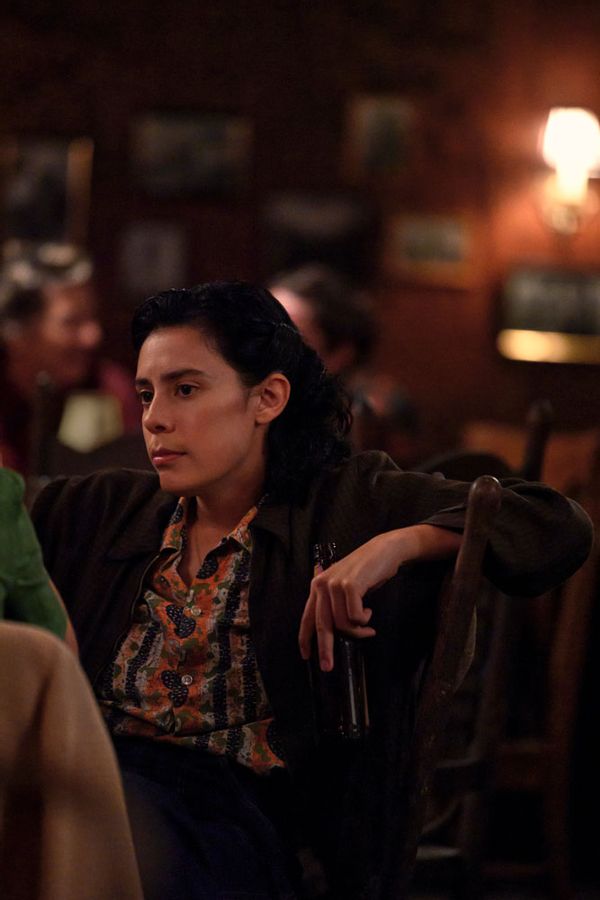 A League Of Their Own (Anne Marie Fox/Prime Video)
A League Of Their Own (Anne Marie Fox/Prime Video)
How else can a woman possibly hope to be taken seriously if the press or coaches or fans know she has kids at home?
Some of the players on the team are young, like Priscilla Delgado's earnest Esti, who is still a teenager and only speaks Spanish at first. But Lupe represents a person who's already lived. Who has struggled, failed, been pushed down and knows exactly what's at stake – and how swiftly it can all be taken away.
Near the end of the series, Lupe reveals that she's a mother. Several of the athletes on the team are, and all are hiding it, as the show intelligently does, disclosing the information late. Why bury a big piece of identity like that? How else can a woman possibly hope to be taken seriously if the press or coaches or fans — even her childless teammates – know she has kids at home? Really, not much has changed in that regard since 1943.
Significantly, it's revealed Lupe was a teen mom. We don't know the circumstances exactly, only that she was alone and her parents took her baby, which both allowed Lupe to grow up and attempt to build a life but also estranged her from her child. She finally tells Esti that she reminds Lupe of her daughter: "It's like seeing her and not seeing her."
But Lupe has long displayed nurturing tendencies in the show, even if she is grudgingly reluctant about it, even more reticent than Carson (Abbi Jacobson) who becomes a kind of parent for the team in her coaching role, or the great Dale Dickey as Sergeant Beverly, whose chaperone character looks out for the women in more ways than they realize. For Lupe, that reluctance to care for others is a façade, hiding the character's huge and vulnerable heart.
She takes Esti under her wing (well, Esti kind of pushes herself under there), as the only person on the team who is bilingual. (The fantastic Kelly McCormack as the slyly charming Jess soon learns some Spanish.)
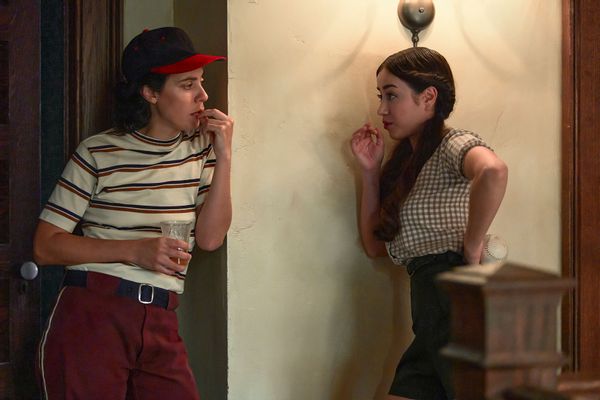 A League of Their Own (Anne Marie Fox/Prime Video)Esti thrusts Lupe into a role of being protective over the girl, which also brings up feelings about Lupe's own identity. As Colindrez told the Los Angeles Times, "It was important to talk about the horrible cultural violence against Mexican Americans that has happened historically . . . I grew up in Texas, and so many of the Mexican American kids I grew up with were like, 'I don't speak Spanish.' It was like they had internalized that kind of racism towards themselves and shame about being different. So I wanted to explore that with this character."
A League of Their Own (Anne Marie Fox/Prime Video)Esti thrusts Lupe into a role of being protective over the girl, which also brings up feelings about Lupe's own identity. As Colindrez told the Los Angeles Times, "It was important to talk about the horrible cultural violence against Mexican Americans that has happened historically . . . I grew up in Texas, and so many of the Mexican American kids I grew up with were like, 'I don't speak Spanish.' It was like they had internalized that kind of racism towards themselves and shame about being different. So I wanted to explore that with this character."
When Lupe instructs Esti on the field that they should both steal bases, a white player on the opposing team cries that they're "yelling stuff in code!"
"It's not code, you moron," Lupe says as she runs. "It's Spanish."
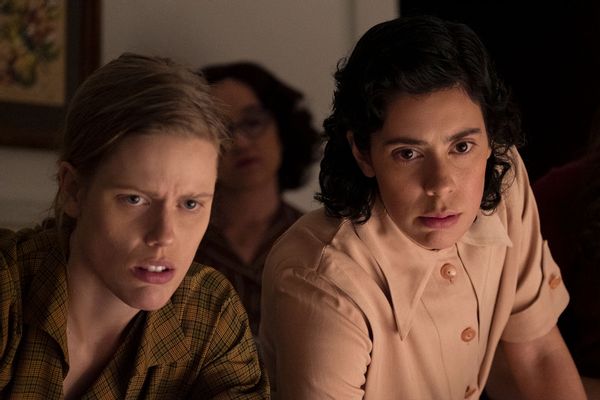 A League Of Their Own (Nicola Goode/Prime Video)Lupe's sexual identity is another significant part of the character, played, like everything about Lupe, with gentle wisdom. She's confident about who she is but not in a boasting way. She doesn't need to boast; she just knows. Lupe and Jess help Carson navigate her own blossoming sexuality without judgment (though Lupe can't resist a few hilarious questions when the two friends find Carson in an underground gay bar in one of the show's best episodes).
A League Of Their Own (Nicola Goode/Prime Video)Lupe's sexual identity is another significant part of the character, played, like everything about Lupe, with gentle wisdom. She's confident about who she is but not in a boasting way. She doesn't need to boast; she just knows. Lupe and Jess help Carson navigate her own blossoming sexuality without judgment (though Lupe can't resist a few hilarious questions when the two friends find Carson in an underground gay bar in one of the show's best episodes).
Want a daily wrap-up of all the news and commentary Salon has to offer? Subscribe to our morning newsletter, Crash Course.
A beloved queer character that Lupe recalls at times is Shane McCutcheon (Kate Moennig) from "The L Word" and "The L Word: Generation Q," another reluctant parent figure who breaks hearts — she doesn't mean to — but would do anything for her friends. Colindrez has the same magnetism, and Lupe, the same quiet wisdom. Despite having the skills, Lupe's not a show-off on the field or off. The word that best describes her is "steady." She'll protest at first, but she'll be there for you. You'll never want her to leave.
Read more
about women and sports
- "There's no crying in baseball!": "A League of Their Own," a film about the sport's women pioneers, resonates at 25
- Sports sexists bringing their A games this week: Female athletes still "have to put up a fight for basic respect"
- Penny Marshall — actor, director, producer and legend — did it her way
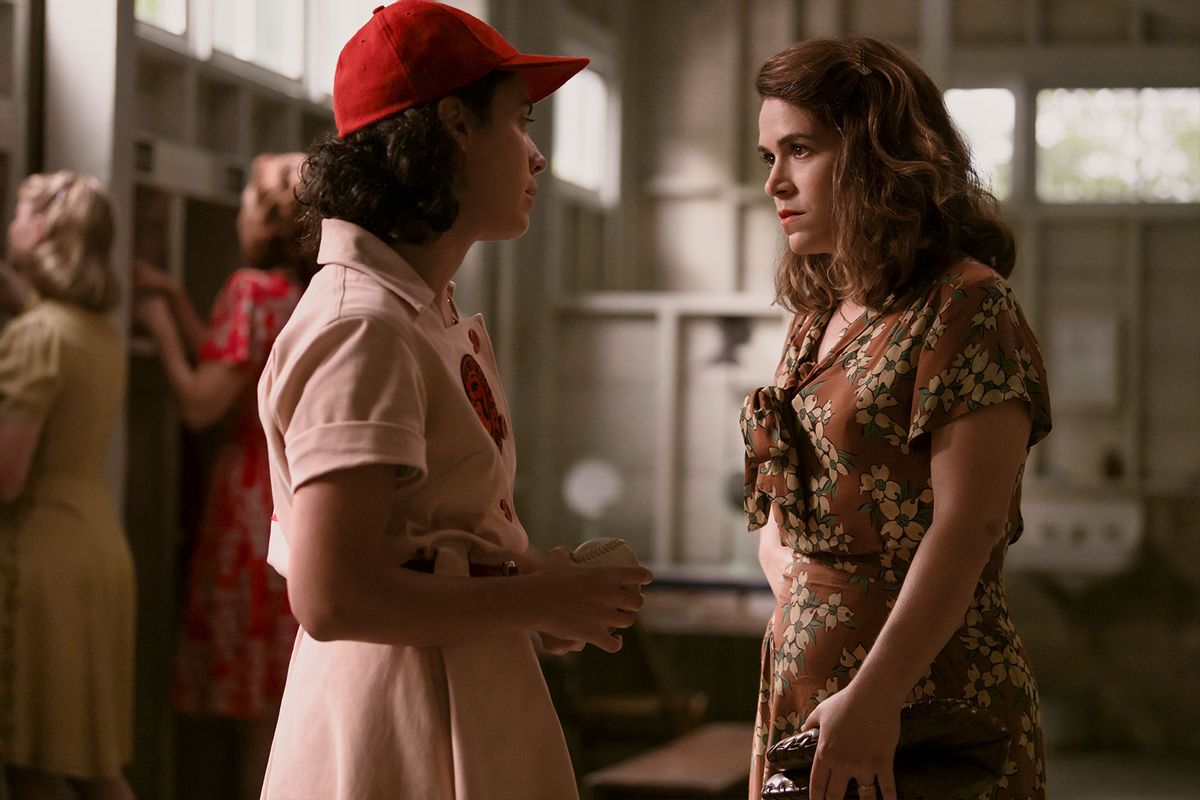
Shares